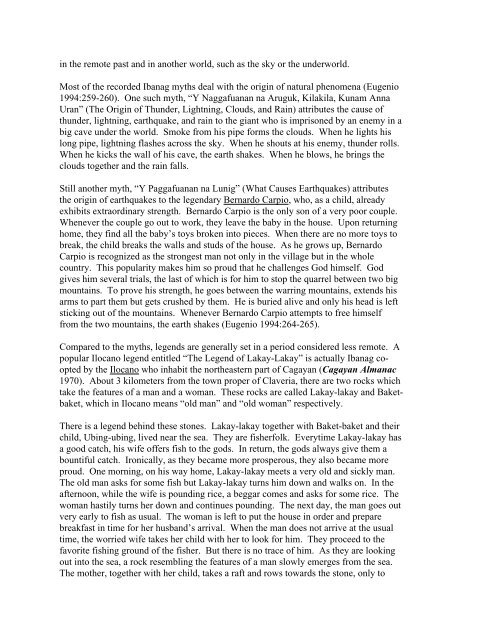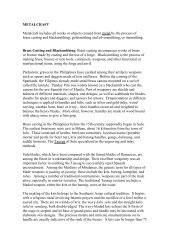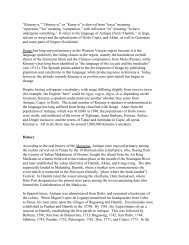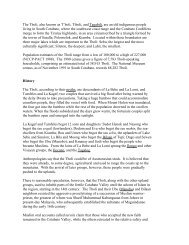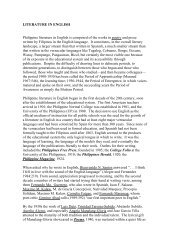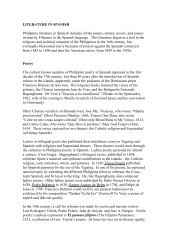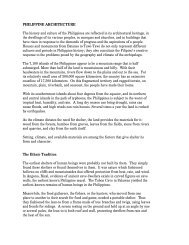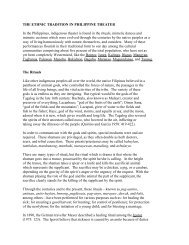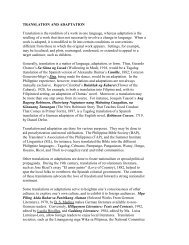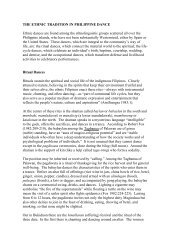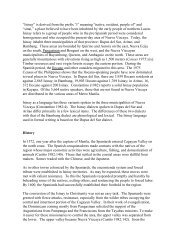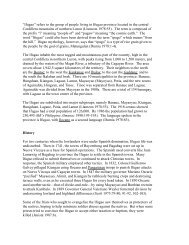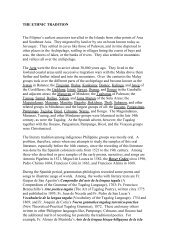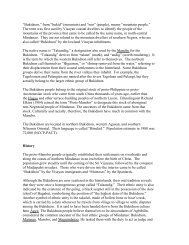The word “Ibanag” derives from the prefix “i” meaning ... - Buffalo
The word “Ibanag” derives from the prefix “i” meaning ... - Buffalo
The word “Ibanag” derives from the prefix “i” meaning ... - Buffalo
You also want an ePaper? Increase the reach of your titles
YUMPU automatically turns print PDFs into web optimized ePapers that Google loves.
in <strong>the</strong> remote past and in ano<strong>the</strong>r world, such as <strong>the</strong> sky or <strong>the</strong> underworld.<br />
Most of <strong>the</strong> recorded Ibanag myths deal with <strong>the</strong> origin of natural phenomena (Eugenio<br />
1994:259-260). One such myth, “Y Naggafuanan na Aruguk, Kilakila, Kunam Anna<br />
Uran” (<strong>The</strong> Origin of Thunder, Lightning, Clouds, and Rain) attributes <strong>the</strong> cause of<br />
thunder, lightning, earthquake, and rain to <strong>the</strong> giant who is imprisoned by an enemy in a<br />
big cave under <strong>the</strong> world. Smoke <strong>from</strong> his pipe forms <strong>the</strong> clouds. When he lights his<br />
long pipe, lightning flashes across <strong>the</strong> sky. When he shouts at his enemy, thunder rolls.<br />
When he kicks <strong>the</strong> wall of his cave, <strong>the</strong> earth shakes. When he blows, he brings <strong>the</strong><br />
clouds toge<strong>the</strong>r and <strong>the</strong> rain falls.<br />
Still ano<strong>the</strong>r myth, “Y Paggafuanan na Lunig” (What Causes Earthquakes) attributes<br />
<strong>the</strong> origin of earthquakes to <strong>the</strong> legendary Bernardo Carpio, who, as a child, already<br />
exhibits extraordinary strength. Bernardo Carpio is <strong>the</strong> only son of a very poor couple.<br />
Whenever <strong>the</strong> couple go out to work, <strong>the</strong>y leave <strong>the</strong> baby in <strong>the</strong> house. Upon returning<br />
home, <strong>the</strong>y find all <strong>the</strong> baby’s toys broken into pieces. When <strong>the</strong>re are no more toys to<br />
break, <strong>the</strong> child breaks <strong>the</strong> walls and studs of <strong>the</strong> house. As he grows up, Bernardo<br />
Carpio is recognized as <strong>the</strong> strongest man not only in <strong>the</strong> village but in <strong>the</strong> whole<br />
country. This popularity makes him so proud that he challenges God himself. God<br />
gives him several trials, <strong>the</strong> last of which is for him to stop <strong>the</strong> quarrel between two big<br />
mountains. To prove his strength, he goes between <strong>the</strong> warring mountains, extends his<br />
arms to part <strong>the</strong>m but gets crushed by <strong>the</strong>m. He is buried alive and only his head is left<br />
sticking out of <strong>the</strong> mountains. Whenever Bernardo Carpio attempts to free himself<br />
<strong>from</strong> <strong>the</strong> two mountains, <strong>the</strong> earth shakes (Eugenio 1994:264-265).<br />
Compared to <strong>the</strong> myths, legends are generally set in a period considered less remote. A<br />
popular Ilocano legend entitled “<strong>The</strong> Legend of Lakay-Lakay” is actually Ibanag coopted<br />
by <strong>the</strong> Ilocano who inhabit <strong>the</strong> nor<strong>the</strong>astern part of Cagayan (Cagayan Almanac<br />
1970). About 3 kilometers <strong>from</strong> <strong>the</strong> town proper of Claveria, <strong>the</strong>re are two rocks which<br />
take <strong>the</strong> features of a man and a woman. <strong>The</strong>se rocks are called Lakay-lakay and Baketbaket,<br />
which in Ilocano means “old man” and “old woman” respectively.<br />
<strong>The</strong>re is a legend behind <strong>the</strong>se stones. Lakay-lakay toge<strong>the</strong>r with Baket-baket and <strong>the</strong>ir<br />
child, Ubing-ubing, lived near <strong>the</strong> sea. <strong>The</strong>y are fisherfolk. Everytime Lakay-lakay has<br />
a good catch, his wife offers fish to <strong>the</strong> gods. In return, <strong>the</strong> gods always give <strong>the</strong>m a<br />
bountiful catch. Ironically, as <strong>the</strong>y became more prosperous, <strong>the</strong>y also became more<br />
proud. One morning, on his way home, Lakay-lakay meets a very old and sickly man.<br />
<strong>The</strong> old man asks for some fish but Lakay-lakay turns him down and walks on. In <strong>the</strong><br />
afternoon, while <strong>the</strong> wife is pounding rice, a beggar comes and asks for some rice. <strong>The</strong><br />
woman hastily turns her down and continues pounding. <strong>The</strong> next day, <strong>the</strong> man goes out<br />
very early to fish as usual. <strong>The</strong> woman is left to put <strong>the</strong> house in order and prepare<br />
breakfast in time for her husband’s arrival. When <strong>the</strong> man does not arrive at <strong>the</strong> usual<br />
time, <strong>the</strong> worried wife takes her child with her to look for him. <strong>The</strong>y proceed to <strong>the</strong><br />
favorite fishing ground of <strong>the</strong> fisher. But <strong>the</strong>re is no trace of him. As <strong>the</strong>y are looking<br />
out into <strong>the</strong> sea, a rock resembling <strong>the</strong> features of a man slowly emerges <strong>from</strong> <strong>the</strong> sea.<br />
<strong>The</strong> mo<strong>the</strong>r, toge<strong>the</strong>r with her child, takes a raft and rows towards <strong>the</strong> stone, only to


